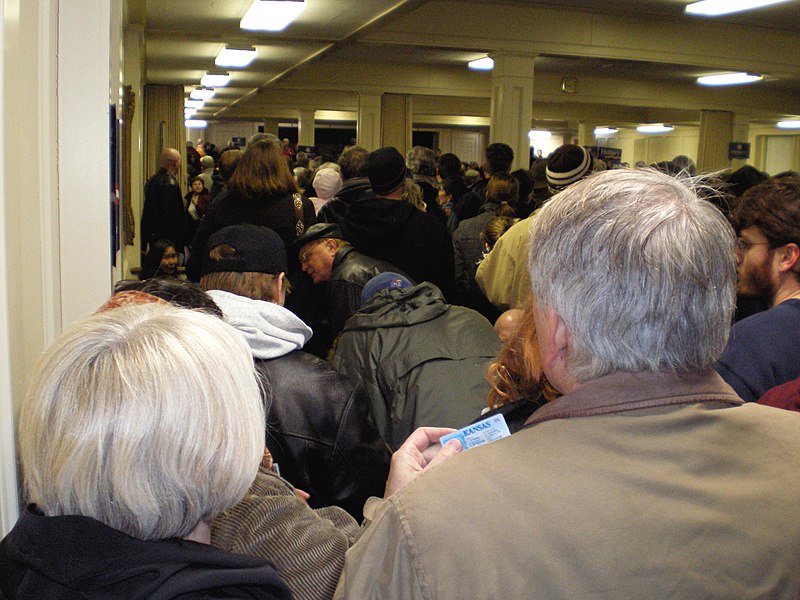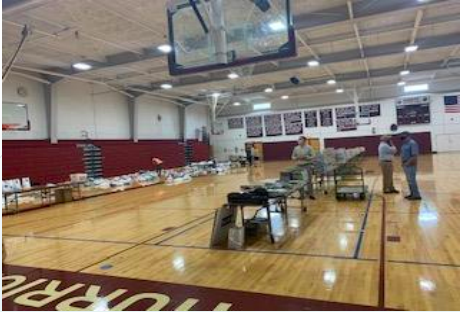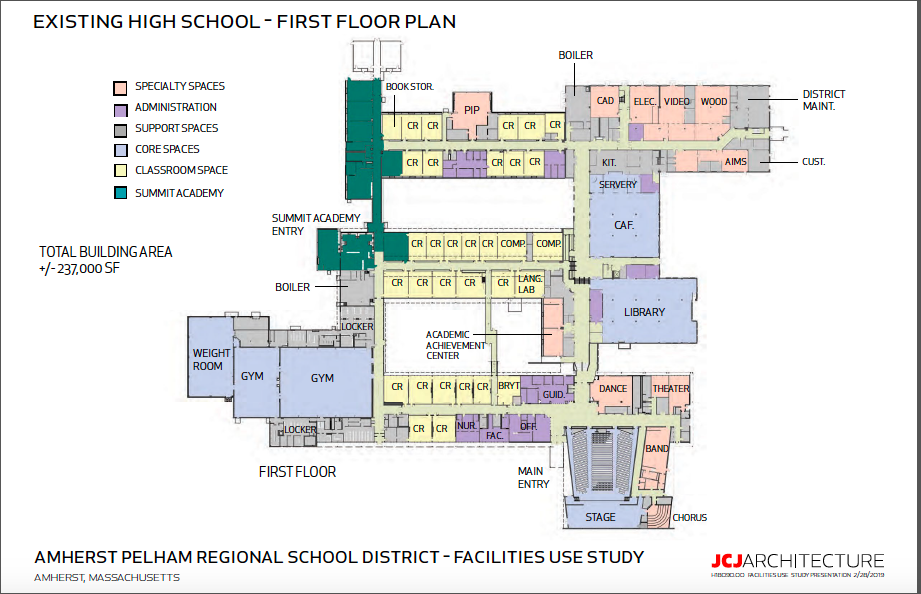Amherst Town Council Can Change Controversial Polling Place Consolidation Plan Until Aug. 12

Voters queue up to vote during the 2008 presidential primary in Kansas. Photo: flckr.com
Plan To Put 10 Precincts In A Single Gym Apparently Unknown To State Officials
A vote by a slim majority of the Amherst Town Council on Monday (8/3) to consolidate all the Town’s eight polling places into one was not necessary in order to meet a state filing deadline as some councilors claimed.
Massachusetts Secretary of State’s Office Spokesperson Debra O’Malley said yesterday (8/4) that the deadline under the law for changing polling places of 20 days prior to an election, would in fact require the Council to vote on Wednesday August 12 at the latest – 20 calendar days before the September 1 state primary. A report evaluating any new plan’s potential adverse impacts would need to be posted publicly three days earlier by Sunday, August 9.
In the meantime, the controversial plan to close the Town’s eight polling places and have all voting take place in the main gym at Amherst Regional High School remains in effect, after Council proponents and the Town Clerk incorrectly claimed there was no time to consider further options. However, Town Council Chair Lynn Griesemer (District 2) told Masslive yesterday that the Council could reconsider at a special meeting set for August 10. Although a meeting is posted on the website, no agenda was listed as of early today, August 5.
Amherst has over 17,000 registered voters, and since about 15,000 voted in the last Presidential election, the consolidation could lead to thousands congregating at the high school amid the COVID-19 pandemic. This type of consolidation is in opposition to federal guidelines calling for measures to reduce large assemblies at the polls. The Center for Disease Control and Prevention Guidance calls on towns to “maintain or increase the total number of polling places available to the public on Election Day to improve the ability to social distance.”
The Amherst Indy has asked O’Malley for a copy of initial guidance sent to town clerks across the state, and will post it when it is received. However, town clerks were told to review polling places, and “look at alternates” if sites are too small to allow for six-foot social distancing. O’Malley said this is especially true if a town has multiple voting locations in a single place. Final guidance has yet to be approved by the State Department of Public Health. However, Governor Charlie Baker repeatedly discouraged large gatherings, linking them to recent COVID-19 outbreaks and a total uptick in positive tests.
Town Councilor Cathy Schoen (District 1), who had led the opposition to single-site consolidation, was asked by the Amherst Indy for comment last night on whether a new motion regarding polling places would be put forward. Schoen replied that she might comment tonight.
Proponents of polling place consolidation on the Town Council pressed for a vote on Monday night, maintaining that the Town had run out of time to consider the issue further. There was prolonged debate about the meaning of the word “day,” and if business days were actually intended under state law, although “day” is not defined or limited in that section, here. O’Malley, at the Secretary of State’s Office, said the law does refer to calendar days.
The move to close eight polling places and create a single new one initially failed at Monday’s Town Council meeting. Town Clerk Shavena Martin told the Council immediately afterward that the 20-day state clock would prevent the Council from voting on the issue if it were postponed to an August 10 meeting. In asserting a deadline of August 4, Martin also contradicted the August 11 deadline date listed in her July 20 presentation
Meanwhile, it is also unclear how much the Secretary of State’s Office actually knew about the polling place plan. A reporter for the Amherst Indy discussed it with O’Malley, who said she thought the Town’s 10 voting precincts would be separated into several different rooms at the high school.
“My understanding is that the school has multiple gymnasiums,” O’Malley said.
Martin has stated that polling for all 10 precincts will take place in a single gym, with the other one to be used as a staging area. The July 20 presentation also shows a single entryway for all voters.
A diagram of the high school shows the two adjoining gyms, and an adjoining weight room.


A July 29 Town Council report on the polling place consolidation is here.
Martin said Monday that her office had received 3,804 postcards requesting mail-in ballots.
Public Outcry
There was a noticeable public outcry on electronic media yesterday (8/4) over the polling place consolidation. Questions were raised about COVID-19 transmission risks associated with a large crowd gathering at a single location, and whether the consolidation would disenfranchise voters, including those who lack personal transportation. The prospect of long lines outside the building was raised, and whether those lines would deter elderly voters, those with young children, and those with physical disabilities, along with working people needing to vote quickly before returning to business.
Town Manager Paul Bockelman said Monday that tents with benches in them would be provided for voters waiting in line.
Anticipating Long Wait Times
A voting time simulation, provided to the Amherst Indy by Tracy Zafian of Amherst, indicates waits of at least 45 minutes to an hour could be likely at peak times based on about 3,400 votes, and could increase throughout the day. The Caltech/Massachusetts Institute of Technology’s simulation tool used to calculate this estimate can be found here. It projects voter wait times based on voting site hours, number of expected voters, number of check-in stations, number of voting stations, estimated average time to check-in, and other factors.
Zafian said she ran simulations based on the assumption that there will be 10 precincts using the ARHS gyms, and that each precinct will have one check-in station, and 4 voting booths. She assumed that it takes an average 2 minutes to check in and 5 minutes to vote. However, the initial calculations did not include time to sanitize booths or equipment in between voters.
“With that scenario and assuming a post-work peak, the evening voter wait times start to grow to 45-60 minutes or more with over 3,400-3,500 voters. If there is a steady number of voters throughout the day, then the wait times steadily grow throughout the day,” Zafian said.
Zafian said she hoped that many people will be persuaded to vote early or by mail, or make use of ballot drop off boxes.
The high school would replace eight polling places to which 10 voting precincts were assigned, including the Bangs Community Center, which handled three precincts, the Wildwood, Fort River and Crocker Farm Elementary Schools, the North Fire Station, the Munson Library and two local churches.
The Council’s move came after numerous public comments and a heated debate. Although Bockelman said that Amherst Health Director Julie Federman supported the plan, Federman did not address the Council, and there is no formal local health assessment of the plan.
The 7-to-6 vote was won by Town Councilors who said the current system is confusing, and can’t operate fully due to COVID-19 concerns anyway. Councilors Evan Ross, George Ryan, Stephen Schreiber, Andy Steinberg, Alisa Brewer, Lynn Griesemer, and Mandi Jo Hanneke voted for the single site, while Cathy Schoen, Sarah Swartz, Shalini Bahl-Milne, Pat DeAngelis, Darcy DuMont and Dorothy Pam voted against it.
The Council did not act on the suggestion of an alternate plan from Schoen, who advocated for keeping as many of the existing sites as possible, while adding the high school as a substitute for all sites that can’t open due to COVID-19 and social distancing.
Hanneke, in calling for a revote after the initial vote for consolidation failed, apparently erred in exercise of the Town Council’s Rules of Procedure Section 7.5b. Those rules state that “any Councilor voting with the non-prevailing side … may move for reconsideration, when such motion is accompanied by the submission of new or additional information.” However, those rules state that a reconsideration motion can’t be the next vote taken at the same meeting, and should be scheduled “at the next regular meeting.” This portion of the rule was not read out by Hanneke and the omission was not noted by any other councilor. Questions remain about the validity of vote since the supposed new information was incorrect.
Debate later in the meeting centered around whether the Town Council could truly assert that the change would not have a disparate adverse impact on access to the polls, based on race, national origin, disability, income or age. When language asserting no ill effect was read aloud by Ryan, a tense exchange arose involving him, Schoen, Pam and Brewer. The recorded segment begins here. The recording of Monday’s full meeting is here.
Last month, Governor Charlie Baker signed a law that extended the option to vote by mail to all Massachusetts voters for both the September 1 state primary and the November 3 general election, and applications for mail-in ballots were sent to 4.5 million registered voters statewide.
However, Amherst Town Clerk Shavena Martin told Indy contributor Maria Kopicki that the Secretary of State has since reported that a large number of vote-by-mail postcards were returned as undeliverable.
Early in-person voting for the September 1 primary will be held statewide August 22-28, including on Saturday August 22 and Sunday August 23. Early voting schedules and locations will be posted at www.MassEarlyVote.com at least one week before early voting begins.
The current Amherst plan calls for early voting only at the Bangs Community Center in August, with the October site to be determined.

Thank you “Marla” !
U put in all the info I need…
– -Chad Fuller